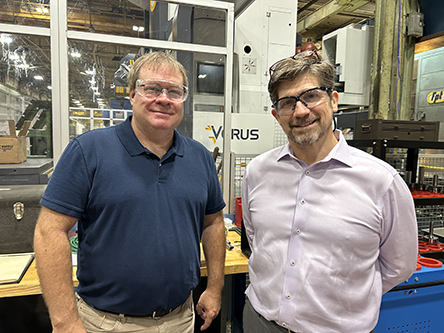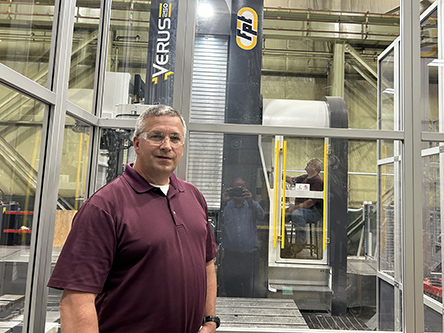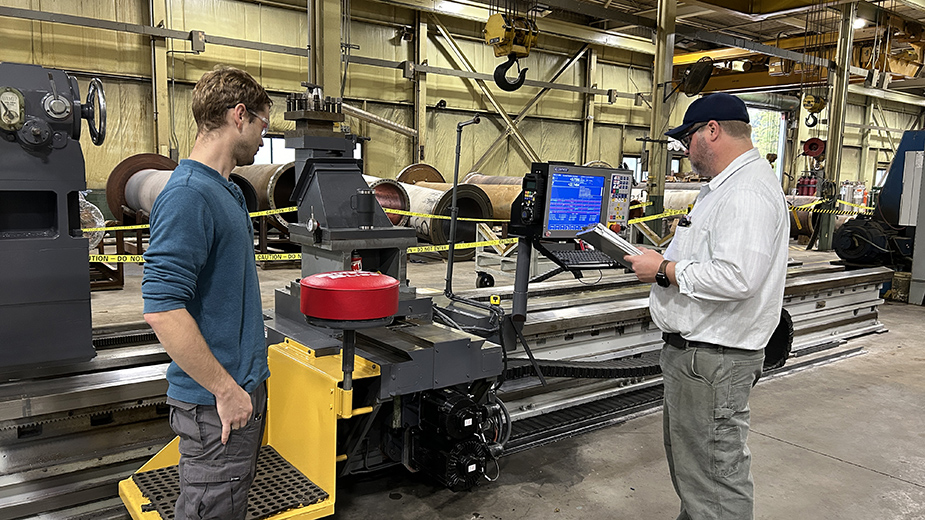SALEM, Ohio – New capital investment and a planned expansion at Butech Bliss Inc. has positioned the Salem manufacturer to become more competitive in the future, while it currently works at breakneck pace to meet accelerating demand.
“We’re on track for a record year,” says Jock Buta, president and CEO of Butech Bliss. “Our book orders are up. We’ll probably surpass $80 million by the end of the year.”
The company is winding down on an $8 million capital project at its campus along Pennsylvania Avenue. It includes the purchase and installation of three new FPT Verus CNC machining centers, a retrofit of a Summit CNC lathe, and a new addition to accommodate the company’s customers in the metal melting equipment sector.
“This line has especially exploded,” Buta says, noting Butech’s business involves manufacturing new equipment and refurbishing existing equipment that is used in melting specialty metals, such as titanium.
Satellite to Self-sustaining
Brian Whitehill, plant manager of Butech’s 240/440 Campus – so named because of the addresses of two buildings on Pennsylvania Avenue – says the operation has dramatically shifted over the years as the company concentrates on adding new capabilities to operations.
“This campus has really gone through a transformation over the last three years, where we have become less of a satellite and more self-sustaining,” Whitehill says. “About 80% of our capital has gone into this facility this year – a real growth.”
Butech manufactures, rebuilds and reconditions components and equipment. “Most of our products hit either steel mills, aluminum mills or the steel service centers,” Buta says.
Business with melt operations that process specialty metals – titanium in particular, he says – has increased dramatically, he adds.
Domestic titanium producers, Buta relates, have invested heavily in their operations to meet demand in the United States. This increase has helped companies such as Butech, impacting not just its melting equipment business, but also its rolling mill and coil processing equipment lines.
“We’ve got big equipment that can flatten titanium sheet, which can go into aircraft, copper crucibles that are used to melt in raw production and our mill group,” he says. “All of this in the last couple of years has really been booming.”
Butech’s Pennsylvania Avenue complex holds approximately 130,000 square feet of manufacturing space between the two buildings. The company’s South Ellsworth Street plant has some 320,000-square-feet of production space with 200-ton crane capacity and a rail spur, which is capable of handling larger machines and production lines.
Upgrades and Efficiencies
The growing business in the metals melting segment has justified the addition of another 8,000 square feet of space at Pennsylvania Avenue, plant manager Whitehill says. “It’s not a ton of square footage, but for the small footprint that we operate in, it’s significant,” he says. “We’ll have more assembly, more weld repair.”

A major part of this business is manufacturing and refurbishing large cylindrical copper crucibles that are used by Butech’s customers to form metal ingots, Whitehill says. These ingots are then processed into parts by the customer or another manufacturer and sent to end-users across the country.
Five years ago, when Whitehill joined Butech, there were 36 active orders in this segment.
“Jock [Buta] hired me to come in and work in the copper department,” he recalls. “We now have 166 open jobs. For me, it’s pretty exciting.”
Workers at Butech are also putting the finishing touches on reconditioning and modernizing a Summit CNC large-capacity lathe that is used to refurbish copper crucibles, Buta says.
“Because we have our own in-house engineering and we design and build automation systems for our equipment, it’s a pretty easy leap to retrofit machining centers,” he says.
Among the bigger investments planned for the site is a new stress-relief furnace, which will occupy the addition to the plant. As it stands, components that require stress-relief treatment are shipped to Butech’s main plant at 550 S. Ellsworth Ave.
“Just three years ago, we didn’t have our warehouse, shipping and receiving, we didn’t have paint, blast or X-ray capabilities,” Whitehill says. “These are all things we’ve done over the last three years.”
Buta says the furnace will help optimize the entire material flow of the plant. The furnace heats a crucible to approximately 1,100 degrees in order to eliminate residual stresses within the metal caused by new welds, removing the chance of imperfections on the component.
The addition should be completed and under roof by early November, according to Buta.

Joe Wilcox, plant manager at Butech’s Ellsworth Avenue operation, says these new CNC units are capable of 80 different automatic tool changes. The plant’s throughput could improve by 25% once all three centers are operational.
Meanwhile, the plant has activated two large FPT Verus CNC horizontal machining centers it purchased this year. The first of these recently came online and the second unit was commissioned in late September. A third machine is being installed.
These machining centers are capable of 80 different automatic tool changes, says Joe Wilcox, plant manager at Butech’s 633 complex in Salem.
“All of our previous generation FPT machines had no tool changers. So it’s a huge productivity improvement,” Wilcox says. He suspects the plant’s throughput could improve by approximately 25% once all three centers are operational.
Attracting Talent
Buta says that bringing on qualified employees is integral to building a future workforce at the company.
The quest to hire younger people especially inspired the company to host its first ever in-house career fair in September. Part of the event was to introduce students and younger applicants to these new investments and machinery, demonstrating how technology has changed the face of manufacturing.
“We had 157 applicants,” Buta says. “It was a great success, and there were lots of good candidates.”
Kees deRuyter, machine shop superintendent, says it’s important to bring younger people into the industry and train them on the quality of this new equipment, which points to the future of manufacturing.
“It’s a big deal,” he says.
Butech, established in 1985 by Jock’s father, John, employs approximately 300.
During the early 2000s, Butech purchased the facilities and intellectual property of Bliss-Salem, an equipment manufacturing company that was founded in Brooklyn, N.Y., more than 130 years ago, but had its office and operations just across the street on Ellsworth Avenue in Salem.
In 2008, Butech acquired the former Seckley building at 440 Pennsylvania Ave. In 2020, the company purchased the building next door at 240 Pennsylvania, which once housed the Columbus McKinnon Corp.
“Although there’s uncertainty in the market due to the pandemic, we felt this was the right time to position our company with the building capacity for not just today’s workload, but where we expect to be in three to five years,” Buta told The Business Journal in 2020.
Now, much of those plans are coming to fruition, and Buta says there’s a sense of excitement throughout the company, especially when compared to the uneasy days of the pandemic.
“We went all out,” Buta says. “By the end of this year, all of the planning and investment we started will be in place and productive. We’ll be looking for even more machinery next year.”
Pictured at top: James Neheisel and Buzzy Lee, both manufacturing engineers, work on the Summit large capacity lathe at Butech Bliss.
